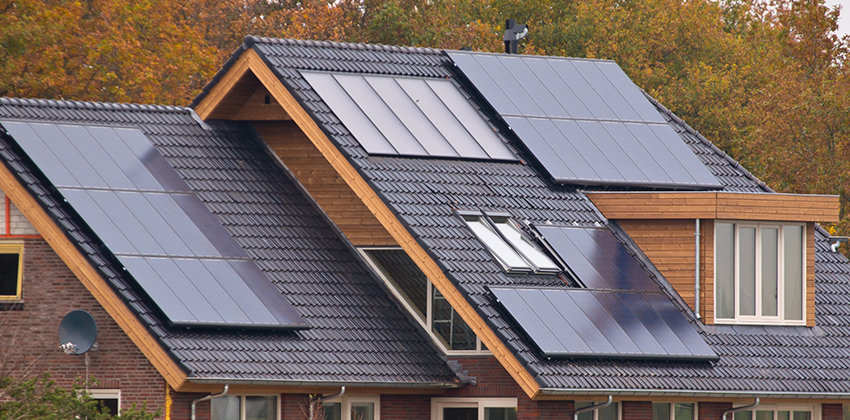See how much solar panels cost in your area

Please enter a valid zip code.
Zero Upfront Cost
Best Price Guaranteed
![]()
![]()
Solar Learning Center > Solar Financing > Solar Lease
Solar Lease

What Is a Solar Lease?
Much like a car lease, a solar lease is an arrangement for you to have access to solar electricity without actually owning a solar system.
In a solar lease, a company will install a solar system on your home and then charge you a monthly rate that replaces your utility electricity bill. Leases are often referred to as “Third-Party Ownership” or TPO because the leasing company owns the system operating on your roof.
Solar lease agreements are typically for 20 or 25 years and may include an escalator that increases the monthly payment each year (more on that below).
Solar leases can be attractive because there are zero upfront costs, immediate energy savings, and no maintenance or monitoring responsibilities. Plus, you get to lend your roof to the awesome cause of clean energy production!
How Do Solar Leases work?
At its core, a solar lease is simple. Instead of making electricity payments to a utility, you make them to a solar company that installed a solar system on your roof.
There are two types of Third-Party Ownership arrangements:
- Leases
- Power Purchase Agreement (PPA)
In a fixed monthly lease, you pay a flat fee every month. For example, if your average utility bill is $150, a solar lease company may offer you flat payment of $100 per month.
In a PPA, you pay for the electricity generated by the leased system, which will vary from month to month. For example, if your utility charges you 16 cents per kWh, a solar lease company may offer you a rate of 12 cents per kWh.
Both types of leases usually include an escalator, which raises your monthly payment each year, typically by around 3%. It’s important to thoroughly read your TPO solar contract to understand if there is an escalator or not.
So, in a fixed monthly lease, your monthly payment would be $100 for the first year, $103 per month in the second year, $106.09 the third year, and so forth.
That may not seem like much for the first few years, but it picks up steam over time.
Monthly payment on a solar lease over time
| Lease Year | Monthly Payment | Annual Cost |
| 1 | $100 | $1200 |
| 5 | $112.55 | $1,350.61 |
| 10 | $130.48 | $1,565.73 |
| 15 | $151.26 | $1,815.11 |
| 20 | $175.35 | $2,104.21 |
Here’s how a solar lease compares to paying for electricity through a utility.

Solar leases provide a path to energy cost savings—especially if there is no escalator or if your utility rate outpaces the escalator. However, owning your solar system (with a cash or loan purchase) can provide greater lifetime savings potential, especially if:
- Your utility rate is exceptionally high
- You have access to robust state and/or local incentives
- You can claim the 30% federal tax credit for installing your system*
*With the signing of the “One Big Beautiful Bill,” the 30% tax credit for homeowner-owned solar systems ends on December 31, 2025. Systems must be installed by the end of 2025 to be eligible for this tax credit before it’s gone.
The 30% tax credit for solar leases (claimed by the installation company) remains in effect for systems installed by the end of 2027.
Is it Better to Buy or Lease Solar Panels?
For the last decade or so, buying solar panels with cash or a loan has been the route to the greatest savings potential. However, with the 30% tax credit for solar ownership ending at the end of 2025, third-party ownership will become a more attractive option for many homeowners.
Why? Because the 30% tax credit for residential leases and PPAs remains in effect through the end of 2027. In this arrangement, the business that owns the system claims the tax credit and passes the savings on to the homeowner in the form of lower lease payments or PPA rates.
Solar Leases vs Ownership
| Third-Party Ownership (Lease or PPA) | Homeowner-owned (Cash or Loan) | |
| Federal Tax Credit | Claimed by leasing company (through 2027) | Claimed by homeowner (through 2025) |
| Upfront cost | Typically $0 or very low | High upfront (cash), with $0 down loans available |
| Monthly Payment | Fixed or per kWh rate, may escalate | Fix loan payment (with interest) or $0 with cash purchase or loan paid off |
| Monitoring & Maintenance | Leasing company is responsible | Homeowner is responsible |
| Increase in Home Value | Limited, depends on lease transferability | Typically increases home value |
| Home Sale Impact | Can add steps, buyer must assume lease | Easier resale, system adds to property value |
| End of Term | Purchase, renew, or remove system | Continue using system with no payments |
Solar Lease: Day 1 Savings with No Ownership Obligations
Solar leases and PPAs are a tried-and-true path to low, steady electricity costs with minimal upfront costs.
Are there benefits to owning your system? Absolutely! And in areas with exceptionally high utility rates and/or robust state-level solar incentives, ownership will remain the preferred option, even after the homeowner-claimed tax credit ends at the end of 2025.
However, without a 30% tax credit for homeowners to claim, third-party owned solar systems will offer greater savings potential for a majority of households.
Related Articles
See how much solar panels cost in your area.

Please enter a valid zip code.

Please enter a valid zip code.
Zero Upfront Cost. Best Price Guaranteed.


